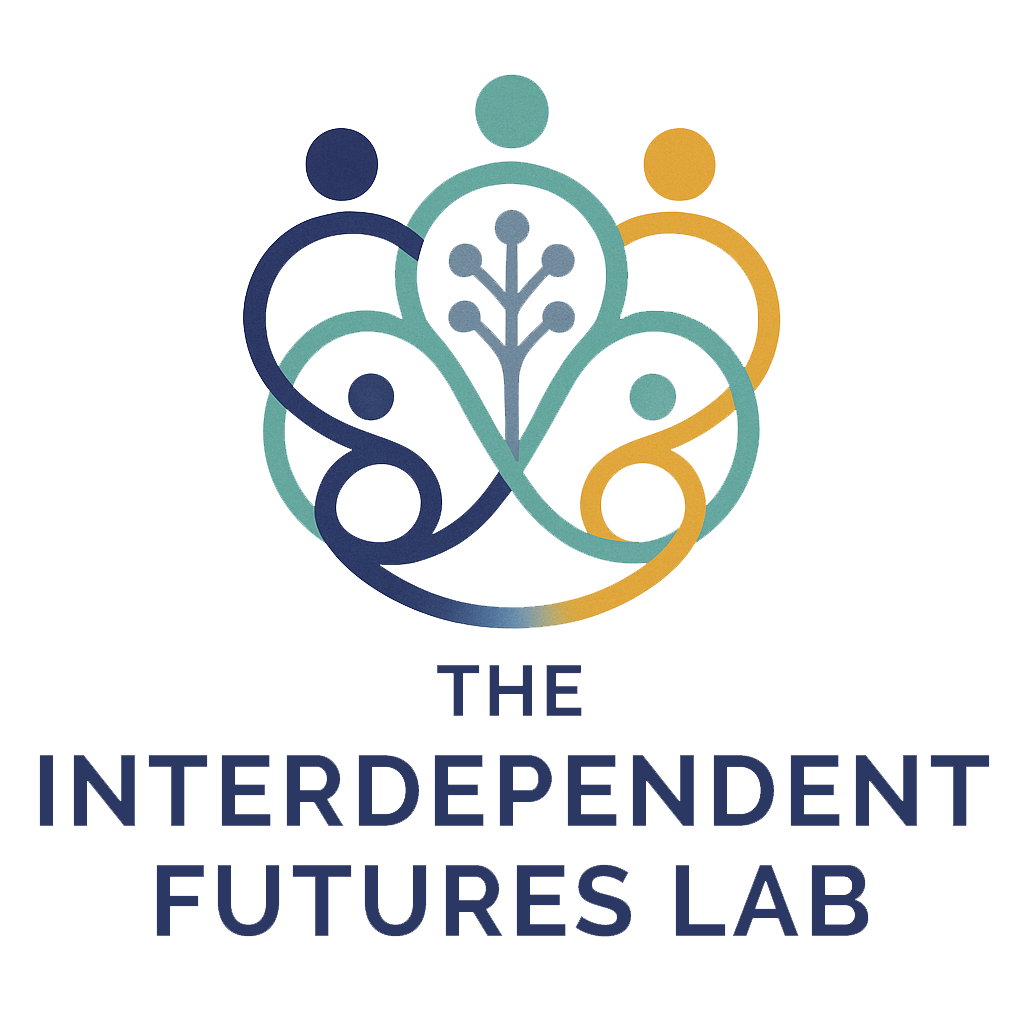Meet the Team & Understand Our Why
“Interdependence moves us away from the myth of independence, and towards relationships where we are all valued and have things to offer. It moves us away from knowing disability only through “dependence,” which paints disabled bodies as being a burden to others, at the mercy of able-bodied people’s benevolence.” -Mia Mingus
In starting the Interdependent Futures Lab we didn’t set out to create a “lab” in the institutional sense. Rather, we set out to create a platform through which researchers, policymakers, and strategists can collaborate in the design and actualization of a possible future; one as urgently needed as it may appear radical.
Through our work, we aspire to bring into being a possible future in which the lived experience of disability and caregiving sets in motion vital transformations in social systems, as well as the relationships, responsibilities, and rights they entail.
Each of us has worked inside systems (including academic, policy, nonprofit) that claimed to care about access and equity. Too often, that care stopped at the surface. We’ve watched disabled people be talked about without being listened to. We’ve seen funding drive priorities instead of community needs. And we’ve felt firsthand how exhausting it is to try to survive within systems that were never built for disabled people or their loved ones.
Too often, disability is framed as an individual problem to be fixed. That’s the logic of the medical model: that disability resides in the body, and solutions come from treatment or cure. But we work from a different understanding, one rooted in disability justice, critical disability studies, and our own lived experiences.
We see disability not as a defect, but as a source of knowledge, capacity, resistance, and possibility. We believe that access is not a checklist—it’s a relational practice. That needs, supports and accommodations do not reflect lower functioning, but point to a higher purpose. With that as a guide, we can replace systems of control with systems born from an ethic of care, working to build the world imagined over generations by activists in marginalized communities.
As researchers and advocates, we decided that we need to make a difference now, and not wait for some future dystopia that further perpetuates the idea that disabled people must be “fixed” or eradicated. The persistence of eugenic ideology, widespread systemic neglect due to austerity, and failures of public health systems during COVID-19 have shown us the harms of running away from our fundamental interdependence. We have to act now to prevent even worse outcomes for the most marginalized.
Our fight for a better future led us to build the Interdependent Futures Lab: a space for research, evaluation, and strategy that’s rooted in disability justice, informed by lived experience, and committed to building new futures together.
We’re a small but expert team of people whose experience of disability, chronic illness, neurodivergence, and caregiving has led us to question, challenge, and work to overcome unjust systems. We believe, in contrast to the notion that disability reflects weakness, that we show our strength by recognizing and honoring our fundamental interdependence.
Sam (they/she) is a disabled writer, researcher, and evaluator trained in medical anthropology and public health. Sam has spent several years in academic and non-profit spaces trying to make knowledge less extractive and more accessible, especially for marginalized communities. They believe that storytelling is strategy, and that information and critical thinking are for everyone.
Adam (he/him) is a policy strategist, data analyst, and action-oriented researcher who has developed and led initiatives to improve the quality and effectiveness of federal data and health care programs. Though disabled himself, his approach to disability justice is most informed by the life of his sister, who has severe intellectual and developmental disabilities (IDD), and mother, her full-time caregiver throughout their childhood. His work is dedicated to both them and all they taught him about trust, care, patience, and a life worth living.
CJ (he/they) is a sociologist and community-based researcher working at the intersections of labor, mental health, harm reduction, homelessness, and tech. With a background in critical theory and a commitment to participatory methods, CJ brings both analytical clarity and deep relational ethics to his work.
We came together because we were tired of silos, whether that’s between research and organizing, between policy and care, or even between thinking and feeling. We believe it’s possible to do rigorous work that’s also human, relational, and bold. And we believe that starting from disability helps us ask better questions—ones that lead to more just, more imaginative, more interdependent futures.
We’re guided by a few core commitments:
Interdependence is the goal, not the failure
Disability is political, not just personal
Lived experience is expertise
Data can be used to uphold power—or to challenge it
Liberation must be collective, creative, and relational
In the months ahead, you’ll hear more from us on topics like:
how disability is (mis)defined in policy and research,
why current data systems often exclude or misrepresent our communities,
and how disability justice frameworks can help transform not just services, but worldviews and the social systems they help build.
All we have is each other, so let’s build a better future together.

